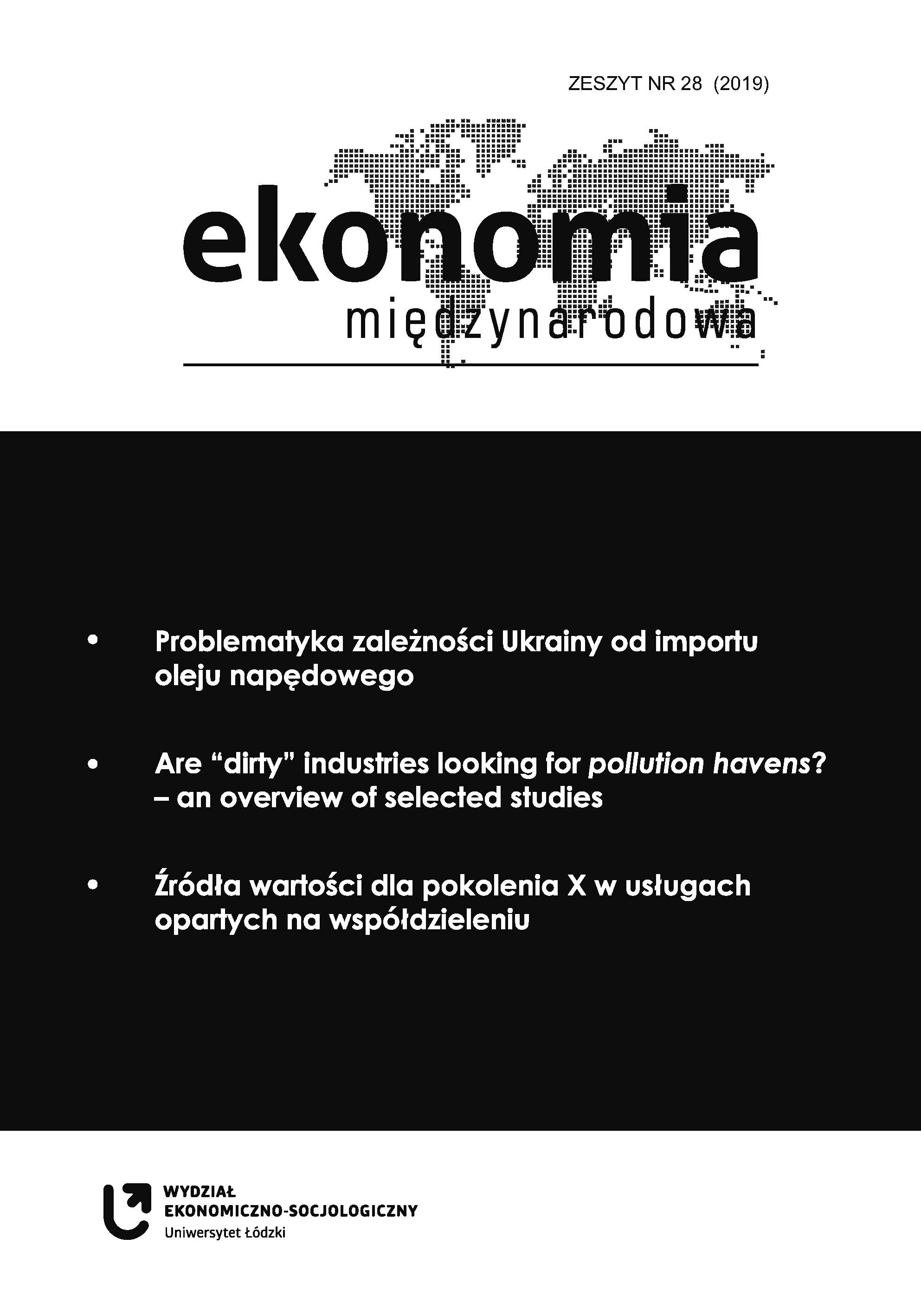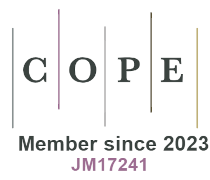Sources of customer value for Generation X in sharing-based services
DOI:
https://doi.org/10.18778/2082-4440.28.03Keywords:
sharing economy, Generation X, customer valueAbstract
Shared services are one of the most dynamically developing branches of modern services. Airbnb and Uber often serve customers not only as a substitute for traditional services, but they become their first choice when it comes to travelling, rides or accommodation. The article indicates the sources of customer value in sharing-based services. The analysis was carried out on Generation X.
The research objective of the article was, therefore, to determine which sources of customer value of sharing-based services affect the perceived value. The categorisation was based on the typology of customer value created by Sheth, Newman and Gross. The results of the study indicated that functional aspects dominate among the sources of value of sharing-based services according to Generation X. The study also showed the importance of situational value and the omission of social and emotional value.
The results of the research fill the research gap in the area of sources of value for Generation X in sharing-based services and indicate their dominant category. In further research, it will be valuable to analyse Generation X using a different theoretical model, as well as to compare Generation X with other age groups.
References
Amaro S., Andreu L., Huang S. (2019), Millenials’ intentions to book on Airbnb, „Current Issues in Tourism”, 22 (18), s. 2284–2298.
Google Scholar
DOI: https://doi.org/10.1080/13683500.2018.1448368
Babin B., Darden W., Griffin M. (1994), Work and/or Fun: Measuring Hedonic and Utilitarian Shopping, „Journal of Consumer Research”, 20 (4), s. 644–656.
Google Scholar
DOI: https://doi.org/10.1086/209376
Banaszek M. (2016), Ekonomia współdzielenia jako alternatywny kierunek rozwoju miast, „Ekonomia społeczna”, 1, s. 51–59.
Google Scholar
DOI: https://doi.org/10.15678/ES.2016.1.04
Berbeka J., Niemczyk A. (2017), Znaczenie i rozwój usług a zachowania współczesnego konsumenta [w:] M. Bartosik-Purgat, Zachowania konsumentów, Wydawnictwo Naukowe PWN, Warszawa.
Google Scholar
Brkljac M., Sudarevic T.J. (2018), Sharing Economy and „Industry 4.0” as the Business Environment of Millennial Generation – a Marketing Perspective, Proceedings of the 29th International DAAAM Symposium 2018, DAMM, Zadar, s. 1092–1101.
Google Scholar
DOI: https://doi.org/10.2507/29th.daaam.proceedings.156
Bywalec C. (2010), Konsumpcja a rozwój gospodarczy i społeczny, C.H. Beck, Warszawa.
Google Scholar
Chang W.-L., Wang J.-Y. (2018), Mine is yours? Using sentiment analysis to explore the degree of risk in the sharing economy, „Electronic Commerce Research and Applications”, 28, s. 141–158.
Google Scholar
DOI: https://doi.org/10.1016/j.elerap.2018.01.014
Cinjarevic M., Kozo A., Berberovic D. (2019), Sharing is Caring, and Millennials Do Care: Collaborative Consumption through the Eyes of Internet Generation, „South East European Journal of Economics & Business”, 14 (1), s. 49–60.
Google Scholar
DOI: https://doi.org/10.2478/jeb-2019-0003
Denny M. (2016), The Business Side: 21st Century Marketing, Part II. Point of Beginning, Pobonline, http://www.pobonline.com/articles/100552-the-business-side-21st-century-marketing-part-ii (data dostępu: 18.09.2020).
Google Scholar
Hartman R. (1967), The Structure of Value: Foundation of a Scientific Axiology, Southern Illinois Press, Carbondale.
Google Scholar
Holbrook M.B. (1994), The Nature of Customer Value: An Axiology of Services in the Consumption Experience [w:] R. Rust, R.L. Oliver, Service Quality: New Directions in Theory and Practice, Sage Publications, Thousand Oaks, s. 21–71.
Google Scholar
DOI: https://doi.org/10.4135/9781452229102.n2
Holbrook M.B. (1999), Consumer Value. A Framework for Analysis and Research, Routledge, Londyn.
Google Scholar
Holbrook M., Hirschman E. (1982), The Experiental Aspects of Consumption: Consumer Fantasies, Feelings and Fun, „Journal of Consumer Research”, 9 (2), s. 132–140.
Google Scholar
DOI: https://doi.org/10.1086/208906
IAB Polska (2018), Raport Strategiczny. Internet 2017/2018, Warszawa.
Google Scholar
Kacprzak A. (2017), Marketing doświadczeń w Internecie, C.H. Beck, Warszawa.
Google Scholar
Kahneman D. (2012), Pułapki myślenia. O myśleniu szybkim i wolnym, Media Rodzina, Poznań.
Google Scholar
Kotler P., Lane Keller K. (2014), Marketing, Rebis, Poznań.
Google Scholar
Kvale S. (2012), Prowadzenie wywiadów, Wydawnictwo Naukowe PWN, Warszawa.
Google Scholar
Marak J. (2016), Wykorzystanie metody ankietowej w badaniu zachowań podmiotów rynku [w:] Mazurek-Łopacińska K., Badania marketingowe, Wydawnictwo Naukowe PWN, Warszawa, s. 129–222.
Google Scholar
Mattsson J. (1991), Better Business by the Abc of Values, Chartwell Learning & Development Limited, Lund.
Google Scholar
Mellan O., Christie S. (2017), Thinking Gen X, „Investment Advisor”, 37, s. 30–34.
Google Scholar
Monroe K. (1990), Pricing: Making Profitable Decisions, McGraw-Hill, New York.
Google Scholar
Oliva R. (2000), Brainstorm your e-business, „Marketing Management”, 9, s. 55–57.
Google Scholar
Ranzini G., Newlands G., Anselmi G. i in. (2017), Millennials and the Sharing Economy: European Perspectives, EU H2020 Research Project Ps2Share.
Google Scholar
DOI: https://doi.org/10.2139/ssrn.3061704
Sanchez-Fernandez R., Iniesta-Bonillo M.A. (2006), Consumer Perception of Value: Literature Review and a New Conceptual Framework, „Journal of Consumer Satisfaction, Dissatisfaction & Complaining Behavior”, 19, s. 40–58.
Google Scholar
Sanchez-Fernandez R., Iniesta-Bonillo M.A. (2007), The concept of perceived value: a systematic review of the research, „Marketing Theory”, 7 (4), s. 427–445.
Google Scholar
DOI: https://doi.org/10.1177/1470593107083165
Sheth J.N., Newman B.I., Gross B.L. (1991), Why We Buy What We Buy: A Theory of Consumption Values, „Journal of Business Research”, 22 (2), s. 159–170.
Google Scholar
DOI: https://doi.org/10.1016/0148-2963(91)90050-8
Strauss W., Howe N. (1997), The Fourth Turning: What the Cycles of History Tell Us about Americas Next Rendezvous With Destiny, Broadway Books, New York.
Google Scholar
Sundararajan A. (2016), The Sharing Economy: The End of Employment and the Rise of Crowd-Based Capitalism, The MIT Press, Londyn.
Google Scholar
SurveyMonkey (2019), Who likes the sharing economy? Most people, but especially millennials, SurveyMonkey, http://www.surveymonkey.com/mp/who-likes-the-sharing-economy-most-people-but-especially-millennials (data dostępu: 19.09.2020).
Google Scholar
Tellis G., Gaeth G. (1990), Best Value, Price-Seeking and Price Aversion: The Impact of Information and Learning on Consumer Choices, „Journal of Marketing”, 54 (2), s. 34–45.
Google Scholar
DOI: https://doi.org/10.1177/002224299005400203
Tisdale S. (2016), Generation X Turns 50!, Black Enterprise, 46, s. 22–23.
Google Scholar
Wagner I.K. (2019), Sharing Economy Participation as a Function of Generational Cohort, Appalachian State University, Appalachian.
Google Scholar
Wagner N., Strulak-Wójcikiewicz R., Landowska A. (2019), Trust in Sharing Economy Business Models from the Perspective of Customers in Szczecin, Poland, „Sustainability”, 11 (23), s. 1–26.
Google Scholar
DOI: https://doi.org/10.3390/su11236838
Williams R. (2018), Forrester: Millennials boost growth of sharing economy, http://www.mobilemarketer.com/news/forrester-millennials-boost-growth-of-sharing-economy/515851 (data dostępu: 18.09.2020).
Google Scholar
Zeithaml V. (1988), Consumer Perceptions of Price, Quality and Value: A Mean- end Model and Synthesis of Evidence, „Journal of Marketing”, 52 (3), s. 2–22.
Google Scholar
DOI: https://doi.org/10.1177/002224298805200302
Ziobrowska J. (2016), Sharing economy jako nowy trend konsumencki, Repozytorium Uniwersytetu Wrocławskiego.
Google Scholar
Downloads
Published
How to Cite
Issue
Section
License

This work is licensed under a Creative Commons Attribution-NonCommercial-NoDerivatives 4.0 International License.









